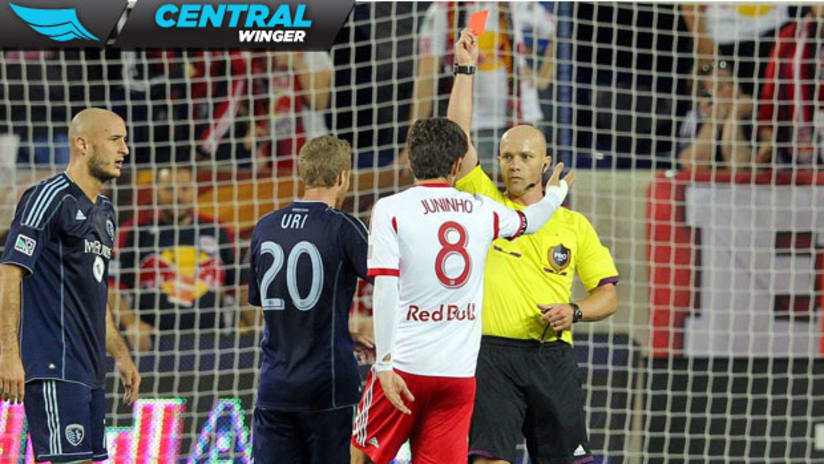For our continuing Referee Week series, stats nerd Devin Pleuler takes a deeper look at just how significant it is when the man in the middle goes nuclear and pulls out a red card.
Since 2011, there have been about 60 red cards issued to MLS squads that were locked in a tie game. In 28 of these instances, the games resulted in a loss for the reprimanded team. That's only almost 50 percent. Not too bad? Well, if you have been following Central Winger over the past year, context is king and there is much more than what meets the eye.
Many of these red cards were conceded quite late. In fact, for the 15 red cards given later than the 80th minute, only one game resulted in a loss for the team finishing with 10 men. Meanwhile, only seven sides have managed to pull out a shorthanded victory after conceding a red card while the score was level.
It's a small sample size, but it's curious that all of these exceptional events happened when red cards were conceded in the middle of the match.
Minute |
Red Cards |
Wins |
Ties |
Losses |
0-10 |
3 |
0 |
2 |
1 |
10-20 |
4 |
0 |
1 |
3 |
20-30 |
6 |
1 |
1 |
4 |
30-40 |
5 |
0 |
0 |
5 |
40-50 |
8 |
2 |
2 |
4 |
50-60 |
5 |
2 |
1 |
2 |
60-70 |
10 |
2 |
3 |
5 |
70-80 |
5 |
0 |
2 |
3 |
80-90 |
3 |
0 |
2 |
1 |
90+ |
12 |
0 |
12 |
0 |
Total |
61 |
7 |
26 |
28 |
*2011 and 2012 MLS seasons
While a red card at even footing may not be the end of the world, a red card while you're already behind is almost certainly the coup de grâce. Since 2011, no team has conceded a red card while losing and rallied for a victory. And of these 49 instances, only seven teams have managed to grab a draw.
Minute |
Red Cards |
Wins |
Ties |
Losses |
0-10 |
0 |
0 |
0 |
0 |
10-20 |
1 |
0 |
0 |
1 |
20-30 |
1 |
0 |
0 |
1 |
30-40 |
1 |
0 |
0 |
1 |
40-50 |
2 |
0 |
1 |
1 |
50-60 |
4 |
0 |
0 |
4 |
60-70 |
11 |
0 |
1 |
10 |
70-80 |
12 |
0 |
2 |
10 |
80-90 |
7 |
0 |
1 |
6 |
90+ |
10 |
0 |
2 |
8 |
Total |
49 |
0 |
7 |
42 |
*2011 and 2012 MLS seasons
There are a few reasons why the distribution of red cards in this table is skewed so heavily toward the later stages of matches. First, and most obviously, late-game situations are highly contested and players are more likely to be carrying previous yellow cards. But it's important to note that this is also biased since games are more likely to be even early in the game than late in the game.
Now, as for teams conceding red cards while winning, the soccer gods are a bit more forgiving on this bunch. More often than not, teams that concede a red card while winning continue to seal the victory – regardless of how long they are playing at a disadvantage.
This sample size is a bit small, but it heartily suggests that conceding a red card in this specific context isn't quite as damning as we're generally led to believe.
Minute |
Red Cards |
Wins |
Ties |
Losses |
0-10 |
0 |
0 |
0 |
0 |
10-20 |
0 |
0 |
0 |
0 |
20-30 |
2 |
2 |
0 |
0 |
30-40 |
2 |
2 |
0 |
0 |
40-50 |
1 |
0 |
1 |
0 |
50-60 |
11 |
5 |
4 |
2 |
60-70 |
7 |
3 |
3 |
1 |
70-80 |
4 |
3 |
0 |
1 |
80-90 |
5 |
3 |
2 |
0 |
90+ |
3 |
3 |
0 |
0 |
Total |
35 |
21 |
10 |
4 |
*2011 and 2012 MLS seasons
When looking at red-card effect rolled up across all game contexts, the dichotomy is even more staggering. After conceding a red card, shorthanded teams have been outscored almost 3:1. As expected, this is especially prevalent for early-game red cards, as the penalized team stands to play a greater portion of the game at a disadvantage.
Minute |
Goals For |
Goals Against |
0-10 |
6 |
7 |
10-20 |
2 |
13 |
20-30 |
5 |
13 |
30-40 |
5 |
14 |
40-50 |
5 |
10 |
50-60 |
7 |
20 |
60-70 |
7 |
22 |
70-80 |
4 |
10 |
80-90 |
1 |
4 |
90+ |
2 |
2 |
Total |
44 |
115 |
*2011 and 2012 MLS seasons
The moral of the story for MLS teams is simple and quite obvious: Don't concede red cards. No matter the context, it decreases your chances of earning points. But if you just can't help yourself, do it late and do it while you're winning. This isn't rocket science – it's just basic soccer sense.












